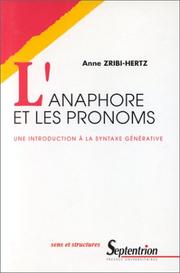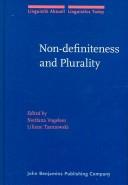| Listing 1 - 6 of 6 |
Sort by
|
Book
ISBN: 311045968X 311046411X 3110464101 311046232X 9783110459685 9783110464108 9783110462326 Year: 2016 Publisher: Berlin De Gruyter
Abstract | Keywords | Export | Availability | Bookmark
 Loading...
Loading...Choose an application
- Reference Manager
- EndNote
- RefWorks (Direct export to RefWorks)
Traditionally, anaphor resolution focused on structural cues of the antecedent. Recently, the interaction between discourse factors and information structure affecting antecedent salience has been more thoroughly explored. This volume depicts selected peer-reviewed research papers that tackle issues in anaphor resolution from theoretical, empirical and experimental perspectives. These collected articles present a wide spectrum of cross-linguistic data (Dutch, German, Spanish, Turkish, Yurakaré) and also offer new results from L1 and L2 acquisition studies. Data interpretation span from typological to psycholinguistic viewpoints and are related to recent developments in linguistic theory. One data analysis puts the issue of anaphor resolution in a historical context. The experimental findings are complemented by reviews of the current literature on the role of discourse units.This volume gives a comprehensive overview of the state of discussion how the interaction between information structure and contextual discourse affects salience. That's why it will be welcomed by all linguists and psycholinguists who are theoretically and / or experimentally investigating several aspects of anaphor resolution.
Anaphore (linguistique) --- Pronoms --- E-books --- Psycholinguistics --- Grammaire comparée et générale --- Reference (Linguistics) --- Signification (Linguistics) --- Linguistics --- Onomasiology --- Semantics --- Grammaire comparée et générale --- Language Acquisition. --- Processing. --- Psycholinguistics. --- Salience.

ISBN: 2859395016 2757434373 9782859395018 Year: 1996 Publisher: Villeneuve d'Ascq Presses universitaires du Septentrion
Abstract | Keywords | Export | Availability | Bookmark
 Loading...
Loading...Choose an application
- Reference Manager
- EndNote
- RefWorks (Direct export to RefWorks)
Ce livre est une initiation à la syntaxe générative chomskyenne spécialement conçu pour les linguistes et apprentis-linguistes formés dans la tradition grammaticale francophone. Le thème de l’anaphore fournit un excellent prétexte pour une tentative de vulgarisation puisque, déjà familier aux spécialistes d’énonciation, de sémantique et de pragmatique, il est aussi l’un des principaux centres d’intérêt de la syntaxe générative, qui leur consacre un module spécifique de son programme de recherche : la théorie du liage. Les sept premiers chapitres conduisent à la formulation standard de la théorie du liage. Le chapitre 8 retrace à grands traits l’histoire des hypothèses génératives concernant la structure en constituants, dont la théorie du liage est crucialement solidaire. Le chapitre 9 passe en revue un certain nombre de problèmes mis à jour depuis la version standard de la théorie. Chacun des chapitres 1 à 8 est suivi d’exercices corrigés qui récapitulent les dernières hypothèses introduites et annoncent les suivantes. L’ensemble est complété par un index notionnel, et par un glossaire français-anglais destiné à faciliter la lecture des travaux cités dans la bibliographie. Au lecteur désireux d’étudier sérieusement la grammaire générative, ce livre fournira des repères conceptuels, terminologiques et bibliographiques. Pour les non générativistes, il sera un ouvrage d’information commode, que chacun pourra consulter en fonction de ses besoins propres.
Grammar --- French language --- Generative grammar. --- Anaphora. --- Pronoun. --- 804.0-56 --- -French language --- -Generative grammar --- Grammar, Comparative and general --- Grammar, Generative --- Grammar, Transformational --- Grammar, Transformational generative --- Transformational generative grammar --- Transformational grammar --- Psycholinguistics --- Langue d'oïl --- Romance languages --- Frans: syntaxis; semantiek --- Anaphora --- Pronoun --- Derivation --- 804.0-56 Frans: syntaxis; semantiek --- Generative grammar --- French language - Anaphora. --- French language - Pronoun. --- anaphore --- pronoms --- syntaxe générative

ISBN: 9027233594 9789027233592 9786612155291 1282155296 9027293171 9789027293176 9781282155299 6612155299 Year: 2006 Volume: 95 Publisher: Amsterdam Benjamins
Abstract | Keywords | Export | Availability | Bookmark
 Loading...
Loading...Choose an application
- Reference Manager
- EndNote
- RefWorks (Direct export to RefWorks)
This collection of studies by leading scholars in the field focuses on the semantics of non-definite (bare and indefinite) plural NPs. The contributions in the first part concentrate on bare plurals and their cross-linguistic counterparts. They discuss applicability of the notion of 'semantic incorporation' to bare plurals by contrasting them to bare singulars, with the aim of accounting for the interaction between the semantics of number and the degree of (in)dependency of the NP with respect to the verb. The articles in the second part examine the relationship between the semantics of number and the semantics of aspect. The contributions in the third part concentrate on non-definite numerical noun phrases by addressing a range of fundamental questions such as: the semantics of indefinite time-phrases, numericals in classifier- and non-classifier languages, scope interactions, the at least- and exactly-readings, referential properties of numericals. The volume will be welcomed by linguists interested in the semantics of number in non-definite NPs.
Definiteness (Linguistics). --- Grammar, Comparative and general --- Aspect. --- Number. --- Numerals. --- Adjectifs indéfinis --- Definiteness (Linguistics) --- Indefiniteness (Linguistics) --- Indéfinis (Linguistique) --- Onbepaald (Taalwetenschap) --- Pronoms indéfinis --- Grammar --- Aspect (Linguistics) --- Dual (Grammar) --- Number (Grammar) --- Plural (Grammar) --- Linguistics --- Number --- Verbal aspect --- Temporal constructions --- Verb --- Nominals --- Determiners --- Aspect --- Numerals --- Grammar [Comparative and general ] --- Philology --- INDEFINIS --- GRAMMAIRE COMPAREE ET GENERALE --- NOMBRES --- ASPECT
Book
ISBN: 9780521870627 0521870623 9780511576690 9780521182379 9780511518058 0511518056 0511576692 1107197562 1282104004 9786612104008 0511517564 0511515707 0511514514 0511516983 0521182379 Year: 2009 Publisher: Cambridge Cambridge University Press
Abstract | Keywords | Export | Availability | Bookmark
 Loading...
Loading...Choose an application
- Reference Manager
- EndNote
- RefWorks (Direct export to RefWorks)
The way in which people address one another is crucial to expressing social relationships and is closely linked with cultural values. In English we call some people by their first names, and others 'Mr' or 'Ms', followed by their surname. In some other languages there are different ways of saying 'you' depending on the degree of social distance. Exploring practices in the family, school, university, the workplace and in letters, this book reveals patterns in the varied ways people choose to address one another, from pronouns to first names, from honorifics to titles and last names. Examples are taken from contemporary English, French, German and Swedish, using rich data from focus group research, interviews, chat groups, and participant observation.
Grammar --- Sociolinguistics --- Forms of address. --- Politeness (Linguistics) --- Grammar, Comparative and general --- Honorific. --- Pronoun. --- Politeness (Linguistics). --- Pronouns --- Honorific --- Courtesy (Linguistics) --- Linguistics --- Address, Forms of --- Address, Titles of --- Titles of address --- Letter writing --- Salutations --- Titles of honor and nobility --- Function words --- Nominals --- Reflexives --- Polite form --- Arts and Humanities --- Language & Linguistics --- Philology --- Grammar, Comparative and general Honorific --- Formes allocutoires --- Énonciation (linguistique) --- Pragmatique --- Grammaire comparée --- Pronoms --- Énonciation (linguistique) --- Grammaire comparée
Book
ISBN: 9783030902483 Year: 2022 Publisher: Cham Springer International Publishing :Imprint: Springer
Abstract | Keywords | Export | Availability | Bookmark
 Loading...
Loading...Choose an application
- Reference Manager
- EndNote
- RefWorks (Direct export to RefWorks)
Georgian language --- Computational linguistics. --- Grammar. --- Automatic language processing --- Language and languages --- Language data processing --- Linguistics --- Natural language processing (Linguistics) --- Applied linguistics --- Cross-language information retrieval --- Mathematical linguistics --- Multilingual computing --- Data processing --- Georgià (Llengua) --- Gramàtica --- Lingüística computacional --- Lingüística aplicada --- Processament de la parla --- Traducció automàtica --- Lingüística matemàtica --- Gramàtica filosòfica --- Gramàtica general --- Gramàtica universal --- Lingüística --- Afixos (Gramàtica) --- Anàfora (Lingüística) --- Cas (Lingüística) --- Comparació (Lingüística) --- Concordança (Gramàtica) --- Conjuncions --- Determinants (Lingüística) --- Diminutius --- Formació de paraules --- Gramàtica categorial --- Gramàtica cognitiva --- Gramàtica comparada --- Gramàtica de construccions --- Gramàtica del paper i la referència --- Gramàtica generativa --- Gramàtica històrica --- Locatiu (Gramàtica) --- Morfosintaxi --- Oracions atributives --- Ordre dels mots --- Preposicions --- Pronoms --- Pronunciació --- Restriccions (Lingüística) --- Substantius --- Trets distintius (Lingüística) --- Verbs --- Gramàtics --- Llenguatge i llengües --- Georgià --- Llengua georgiana --- Llengües caucàsiques
Book
ISBN: 3319709844 3319709836 Year: 2018 Publisher: Cham : Springer International Publishing : Imprint: Springer,
Abstract | Keywords | Export | Availability | Bookmark
 Loading...
Loading...Choose an application
- Reference Manager
- EndNote
- RefWorks (Direct export to RefWorks)
This book focuses on the most commonly made grammar mistakes by non-native English speakers. This means that you can set yourself a reasonable target. So rather than trying to learn all English grammar, just concentrate on those issues that tend to be used the most frequently and/or tend to create the most misunderstandings. Each chapter contains: Examples of typical mistakes. Examples of correct usage. Rules / explanations. A short exercise where you can immediately practise what you have learned. Additional exercises. Keys to all exercises. The book also contains a Teachers Introduction. Easy English! is a series of books to help you learn and revise your English with minimal effort. You can improve your English by reading texts in English that you might well normally read in your own language e.g. jokes, personality tests, lateral thinking games, wordsearches. doing short exercises to improve specific areas grammar and vocabulary, i.e. the areas that tend to lead to the most mistakes - the aim is just to focus on what you really need rather than overwhelming yourself with a mass of rules, many of which may have no practical daily value Other books in the Easy English!series include: Wordsearches: Widen Your Vocabulary in English Test Your Personality: Have Fun and Learn Useful Phrases Word games, Riddles and Logic Tests: Tax Your Brain and Boost Your English Top 50 Grammar Mistakes: How to Avoid Them Top 50 Vocabulary Mistakes: How to Avoid Them.
English language --- Linguistics. --- Linguistic science --- Science of language --- Language and languages --- Grammar --- Study and teaching. --- Grammar, Comparative and general. --- English language. --- Language and languages. --- Grammar. --- English. --- Language Education. --- Foreign languages --- Languages --- Anthropology --- Communication --- Ethnology --- Information theory --- Meaning (Psychology) --- Philology --- Linguistics --- Germanic languages --- Comparative grammar --- Grammar, Philosophical --- Grammar, Universal --- Philosophical grammar --- Grammar, Comparative --- EFL (English as a foreign language) --- English as a foreign language --- English as a second language --- English to speakers of other languages --- ESL (English to speakers of other languages) --- ESOL (English to speakers of other languages) --- TESL (English to speakers of other languages) --- Study and teaching --- Language and education. --- Educational linguistics --- Education --- Anglès --- Gramàtica --- Ensenyament de la llengua --- Ensenyament --- Ensenyament de llengües estrangeres --- Gramàtica filosòfica --- Gramàtica general --- Gramàtica universal --- Lingüística --- Afixos (Gramàtica) --- Anàfora (Lingüística) --- Cas (Lingüística) --- Comparació (Lingüística) --- Concordança (Gramàtica) --- Conjuncions --- Determinants (Lingüística) --- Diminutius --- Formació de paraules --- Gramàtica categorial --- Gramàtica cognitiva --- Gramàtica comparada --- Gramàtica de construccions --- Gramàtica generativa --- Gramàtica històrica --- Locatiu (Gramàtica) --- Morfosintaxi --- Oracions atributives --- Ordre dels mots --- Preposicions --- Pronoms --- Pronunciació --- Restriccions (Lingüística) --- Substantius --- Trets distintius (Lingüística) --- Verbs --- Gramàtics --- Llenguatge i llengües --- Gramàtica del paper i la referència --- Llengua anglesa --- Llengües germàniques --- Anglès medieval --- Anglès parlat --- Manuscrits anglesos --- Abreviatures angleses --- Filologia anglesa --- Spanglish
| Listing 1 - 6 of 6 |
Sort by
|

 Search
Search Feedback
Feedback About UniCat
About UniCat  Help
Help News
News